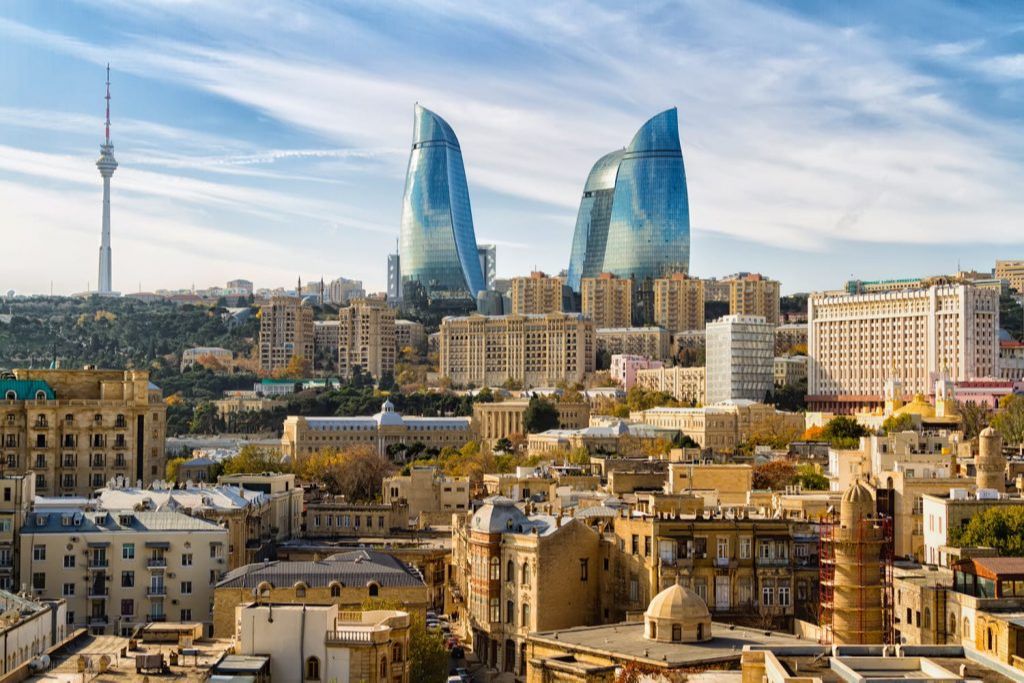Country Information

The Republic of Azerbaijan is a state in the eastern part of the South Caucasus. Territory – 86.6 thousand square meters. km.
Azerbaijan is divided into 66 districts, 12 cities of republican subordination and 1 autonomous republic - the Nakhichevan Autonomous Republic with an area of 5.5 thousand square meters. km, territorially separated from the rest of the country by Armenia and Iran.
Capital
The capital of Azerbaijan is Baku, a city with a population of 2.150 million people, located on the southwestern coast of the Absheron Peninsula, washed by the Caspian Sea. The history of Baku dates back, according to archaeologists, at least two thousand years. Since ancient times, there was a seaport here, and the city was the intersection of caravan roads, including the Great Silk Road that passed through it. During the reign of the Shirvanshahs, Baku was the capital of the famous Shirvan. In the 19th century, it became the largest city in the Caucasus, an industrial and cultural center. Since 1991, Baku has been the capital of the independent state of Azerbaijan. Today, several large-scale international urban planning projects are being implemented in the capital of Azerbaijan. Among them are the FlameTowers complex, the Heydar Aliyev Center, SOCAR Tower, the Port of Baku and White City complexes, the Olympic Stadium, the Republican Wrestling Center and many others. Baku is also known for its exhibition and concert halls, art galleries, theaters, museums, sports complexes, an extensive network of international hotels, excellent restaurants and, of course, beaches where you can sunbathe and swim for five months a year. Many talented architects worked in Baku, including those invited from other countries. Thanks to them, and not least to very progressive clients, the city was decorated with wonderful buildings, many of which are now considered examples of architectural solutions. Nowadays, art historians talk about a special “Baku style”, which is completely unique.
Population of Azerbaijan – As of June 1, 2022, the population was 10,179,147 people. 52.9% was urban population, 47.1% was rural
In accordance with the Constitution (adopted on November 12, 1995), Azerbaijan is a democratic, secular, unitary republic headed by a President elected for a 5-year term through universal direct and equal elections by secret ballot. I.G. Aliyev was elected President of the Republic of Azerbaijan in February 2024 for a fifth term. The President appoints the Prime Minister and members of the Cabinet of Ministers.
Legislative power is exercised by the Milli Majlis (parliament). Chairman of the Milli Majlis – Sahib Gafarova. The Milli Majlis has a 5-year mandate and consists of 125 deputies elected by a majoritarian system.
Public holidays: New Year's Day (January 1 and 2), International Women's Day (March 8), Victory Day over Fascism (May 9), Independence Day (May 28), National Salvation Day of the Azerbaijani People (June 15), Armed Forces Day of Azerbaijan Republic (June 26), Day of Restoration of State Independence (October 18), Victory Day (November 8), State Flag Day of the Republic of Azerbaijan (November 9), Constitution Day (November 12), National Revival Day (November 17), Azerbaijanis Solidarity Day peace (December 31), Novruz holiday - five days, Eid holiday - two days, Ramadan holiday - two days.
In the Republic of Azerbaijan, religion is separated from the state and is represented by a set of various religious movements and denominations common among the ethnic groups inhabiting the country and living throughout the territory of Azerbaijan.
More than 99% of the country's population are Muslims. Approximately 65% of Azerbaijan's population is Shia Muslim and 35% is Sunni Muslim.
There are 6 Orthodox churches in the country, 3 of which are located in Baku.
GDP in 2022 was $20 billion, $6,842 per capita.
The main natural resources of the country and the main factors of economic development are oil and gas.
In 2023, the volume of oil and condensate production in Azerbaijan amounted to 30.2 million tons, 25.2 million tons and 48.3 billion cubic meters of natural gas were exported.
According to the State Customs Committee of Azerbaijan, in January-November 2023, the volume of trade turnover between Azerbaijan and the CIS countries amounted to 5 billion 851 million 28 thousand US dollars. Over 11 months, exports worth 1 billion 502 million 99 thousand US dollars and imports worth 4 billion 348 million 929 thousand US dollars were carried out between Azerbaijan and the CIS countries.
The monetary unit is manat (equal to 100 qepik). Official exchange rate as of January 30, 2014: 1 manat = 1.27 US dollars.
Climate
Azerbaijan has unique natural resources: 9 of the 11 main types of climatic zones of the globe are represented here - from subtropics to high alpine meadows. The average July temperature ranges from +5 C in high mountain areas to +27 C in lowland areas, in January, respectively, from -10 C to +3 C. At the same time, the maximum summer temperature can reach +45 C, while in winter the thermometer in mountainous areas can drop to -40 C at night. Precipitation ranges from 200 mm per year on the slopes of the foothills of the Greater Caucasus, to 1200-1700 mm in the Lankaran Lowland. The best time to visit the country is from April to October.
Azerbaijan is a member of the UN, the CIS, the Council of Europe, the OIC, GUAM, the Non-Aligned Movement and other organizations, and pursues an active foreign policy, the priority of which is the settlement of the Nagorno-Karabakh conflict and the restoration of the territorial integrity of the country.